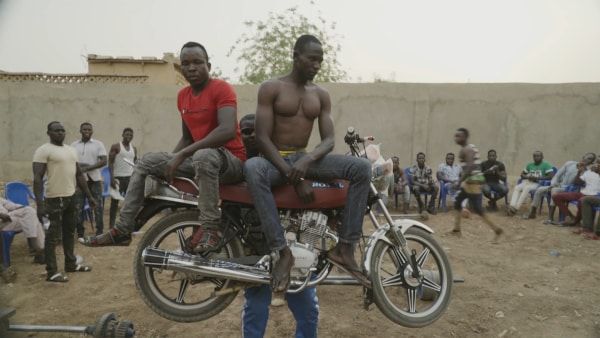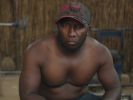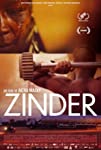Eye For Film >> Movies >> Zinder (2021) Film Review
Zinder
Reviewed by: Amber Wilkinson

The life of the marginalised is placed front and centre in Aicha Macky's documentary about life in the Kara-Kara district of Zinder, a town that lies just 60 miles from Niger's border with Nigeria. Kara-Kara was once a place where lepers were sent, leading to a social stigma that attached not just to them but to their children, which in turn fuelled an economic deprivation that resulted in most youngsters forming affiliations with gangs, named Palais, as a means of protection.
Kara Kara is a place where reputations and appearances can be deceptive. Take the gang that Macky immerses herself in, for example, although apparently named after Hitler, one of the members, Siniya Boy tells her "It's the name of a guy in America. We've heard he's an invincible warrior". The "warrior" element of this is the most important as physique seems to be vital to these guys. Macky captures them working out at their compound, proving themselves by lifting a motorbike, while mercilessly ribbing those who can't, as though their sheer physical appearance is not just a means of protection and status but the one element of life over which they have full control.

Siniya Boy is just one of our guides to the district, who offers his insights alongside former palais boss, now turned taxi moto driver Bawo, and intersex gang member Ramsses, a petrol smuggler who makes regular forays to the border.
Macky allows the complexity of the situation to emerge through strong footage of the day-to-day workings of the district and interviews. These guys seem very affable, but their skin tells the story of dozens of skirmishes, the litany of what caused their scars - knife, razor, machete - reading like a shopping list of deadly weapons. Bawo, who seems every inch the soft-spoken family man these days, also talks, albeit with deep regret, about the days when he participated in horrendous gang rapes, often of under-age girls, in the red light district.
The documentarian also gives a sense of what drives the area's problems. She was born in Zinder herself, though not Kara-Kara, and asks why her life has been so different to that of Siniya Boy. "It's education," he says, something we see in the film comes with quite a substantial price tag. Bawo, meanwhile, points to the general lack of work opportunities - footage of a nearby oil refinery that was supposed to bring jobs but hasn't, underlying the lack of legal employment.
Macky's questions are direct and Julien Bossé's camerawork measured and careful, whether he's watching the gang heft weights or capturing a border smuggling run. There are clear attempts to forge a better life here, with the Hitler gang aspiring to be a security firm - something hampered by a judicial system that seems weighted against them - but there's also a feeling of nihilism from some quarters, with some so desperate they would rather be blown up by extremists Boko Haram than live as they are.
At just 83 minutes, this is a tight little snapshot that manages to draw in themes from the bigger picture of sociopolitics in Niger without losing its focus.
Reviewed on: 20 Apr 2021















